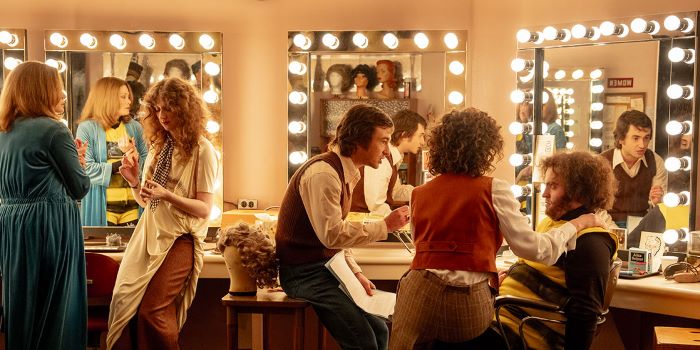
From left, Kim Matula, Emily Fairn, Gabriel LaBelle, Rachel Sennott, and Matt Wood in Saturday Night (TIFF)
The early years of the NBC late-night sketch comedy show Saturday Night Live, and how it found its footing, were covered in Doug Hill and Jeff Weingrad’s book Saturday Night: A Backstage History of Saturday Night Live back in 1986. Hill and Weingrad points to the show’s fourth episode in its inaugural season, hosted by Candice Bergen (not then known for her comedic skills), as the moment when the guest host, cast, and writing staff gelled, meeting its creator and producer Lorne Michaels’s objective to present contemporary, edgy humor suitable for late-night programming. (The original cast was called the Not Ready for Prime Time Players.) The camaraderie between Bergen and cast member Gilda Radner as they struggle not to laugh, and fail, is palpable. In her closing remarks at the show’s end, Bergen comes across as feeling elated. According to Hill, the cast felt the same.
In Jason Reitman’s fictional fast-paced retelling of the 90-minute lead-up to the series’s October 1975 premiere, there is uncertainty about what the show is about and whether it will even air that night. By the time the program goes live nationally, audiences will have the impression that SNL is already a smash.
During the run-up to showtime, one mishap follows another. Studio lights fall from the ceiling. Crew members don’t give a damn. Cast members and alpha-males Chevy Chase (a well-cast Cory Michael Smith) and John Belushi (Matt Wood) are already at each other’s throats, with success going to Chase’s head, all before a single episode has aired. Anyone who has gone through a dress rehearsal, in a community theater or elsewhere, will find it odd that a half hour before the show’s airing, the decision is made to have Chase anchor the “Weekend Update” segment, replacing the monotone Michaels. Many such incidents, and there are plenty of them, ring untrue and are more at home on 42nd Street—the 1933 movie, not the location.
The incongruities continue. Milton Berle (J.K. Simmons), aka Mr. Television, the star of late-1940s TV, wanders in to check out the new competition. (Berle hosted a 1979 episode that is famous as one of SNL’s low points. Reportedly no one got along with the Borscht Belt comedian.) Later on, producer Michaels (milquetoast Gabriel LaBelle) ventures to the next-door studio where Berle is taping a cheesy variety show called The Rumpus Room, dancing and grinning along with Las Vegas–style dancers. Ah, why would another variety show tape at 10:30 PM on a Saturday night? Nor did that program actually exist.
The sequence likely means to highlight the old-school programming that SNL upended, or at least gave the finger to. Perhaps out of respect to 90-something Carol Burnett, the script refrains from anyone criticizing or panning Burnett or her show, though in Hill and Weingrad’s book, and elsewhere, the writers and cast wanted to be the opposite of her long-running, popular variety series.
The first decades of SNL have been rightfully seen as a boy’s club, and the film mirrors (intentionally?) that notion. Gilda Radner (Ella Hunt), the only breakout female star in the first cast, is everybody’s kid sister, wearing overalls and horsing around with the camera crew, but hardly the center of focus. Lorraine Newman (Emily Fairn) grins and chews gum. However, Jane Curtin (Kim Matula) has a knowing monologue about why she was cast, basically as the hot young mom.
Strangely, one woman with plenty of screen time is Chevy Chase’s then-girlfriend and later wife, Jacqueline Carlin (the statuesque Kaia Gerber, towering over all), who appeared in several episodes. Meanwhile, fans of Berle may kvetch in horror at his portrayal here, now that a new generation may know Uncle Miltie more for his reportedly large endowment than anything else. (Yes, he whips it out in a standoff with Chase, and to impress Carlin.) Among the celebrities portrayed wandering the halls or biding their time during the fraught final rehearsal are Andy Kaufman, Jim Henson, Billy Crystal, Billy Preston, Janis Ian, and George Carlin, the premiere’s host.
Even if you were to cut Saturday Night some slack for being a movie, it could have used more oomph, even if that means further fictionalizing. All plotlines point to the show’s creator Michaels, who by most reports has remained famously deadpan throughout the decades. Here he also is outwardly unflappable, causing the tension to deflate as he saunters from crisis to crisis as if he had all the time in the world. The young producer is so laid back that he has time to have a drink at a bar a half hour before airtime. There, as luck would have it, he discovers a writing talent sitting next to him and hires him on the spot.
Nevertheless, the movie certainly gets one thing right: Many on the original show were stoned and/or coked-out of their minds.
Saturday Night will be released in theaters this fall.
















Rachel Sennott, as Lorne Michaels’ soon to be ex-wife unquestionably had the most screentime.
Good point. I made the correction.